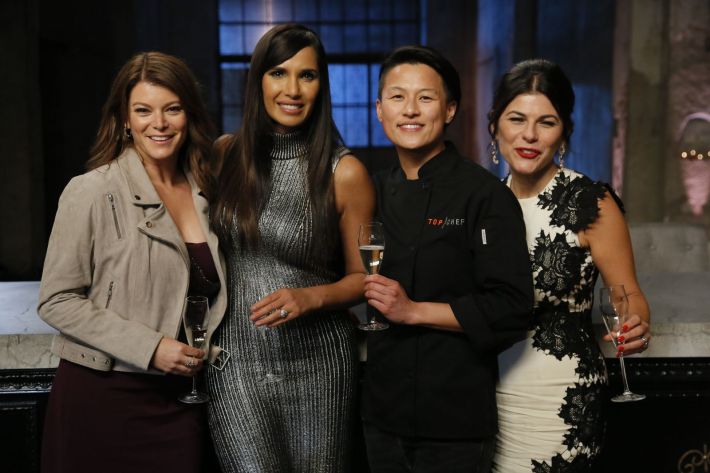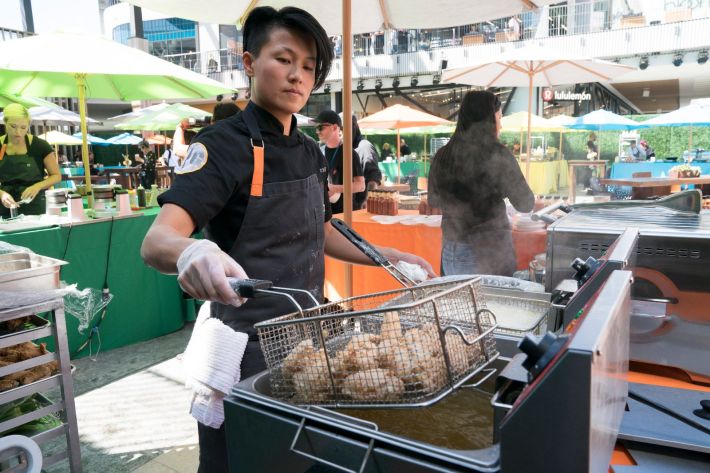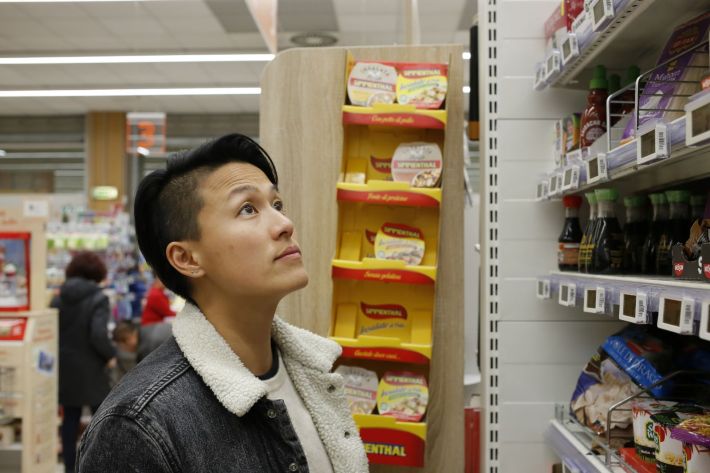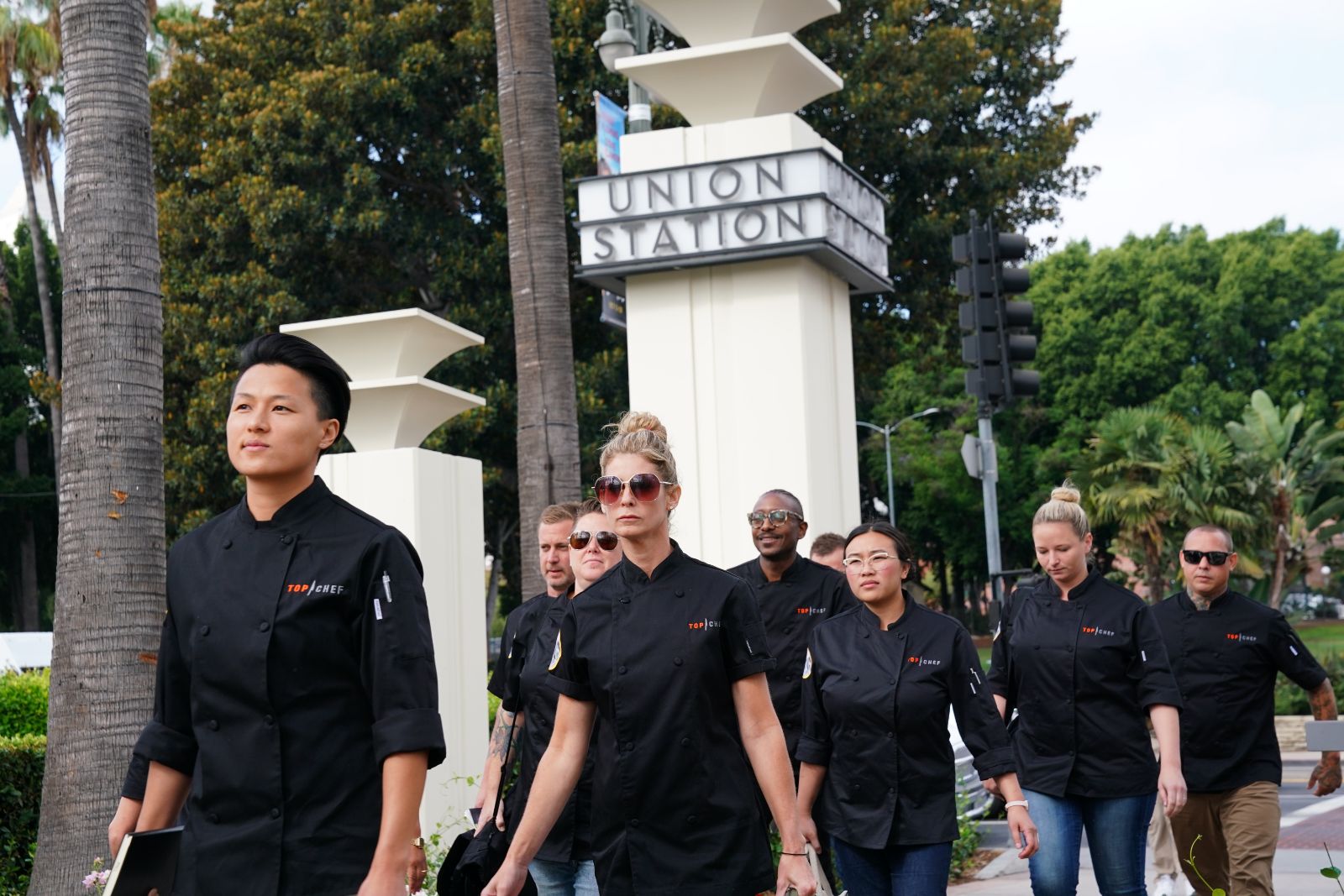[dropcap size=big]S[/dropcap]eeing an out queer woman of color from the San Gabriel Valley win Top Chef in the middle of Pride Month, during our intense time of national and cultural reckoning with racism, felt as if the Dodgers had just won the World Series.
All season long, my fem partner, hetero sisters, my Japanese-Mexican brother in law from the San Gabriel Valley, and so many more family, friends, and fans around the world rooted for Chef Melissa King as she competed for the second time on Top Chef: All-Stars, set in L.A.
So when Top Chef host Padma Lakshmi spoke those words on the Season 17 finale of Bravo TV’s Emmy- and James Beard Award-winning show, we hugged each other and jumped up and down, smiling and crying at the same time: “Melissa...you are the Top Chef.” We took whiskey shots, cheered some more, and texted other friends and family members. Melissa King’s Top Chef win this year felt that huge for us as longtime fans of the show.

We’ve watched a bunch of dudes and only six women win Top Chef in the show’s seventeen seasons. Watching King get crowned with the Top Chef title was special, like watching your friend from school or a family member win. We felt gratifying, visceral joy. Top Chef fans first met Chef Melissa King on Season 12, shot in Boston. King competed fiercely and finished as a finalist, losing to Chef Mei Lin. Five seasons later, King would come roaring back to win both the Top Chef title and the “Top Chef Fan Favorite” online poll.
Her plans to donate 100 percent of the Fan Favorite prize money of $10,000 to charities such as the Black Visions Collective, Asian Americans for Equality Asian Youth Center, and The Trevor Project, underscores her deep commitment to her communities.
According to Bravo Buzz, King said this about her recent win: “I’m a proud Asian American, queer, woman. As a triple minority, winning ‘Top Chef’ means so much more than just winning it for myself. I hope my journey brings inspiration to anyone that’s ever felt challenged due to their sexuality, their gender, or the color of their skin.”
Pride is more than just being proud. It means being yourself, believing in yourself, living your truth. And being unapologetic about it.
Born in Whittier and a graduate of Glen A. Wilson High School in Hacienda Heights—the same district as Padma Lakshmi’s alma mater, Workman High School—Chef King is known for her California cuisine with Chinese and other Asian influences executed with French-trained precision. She made the flavors of the San Gabriel Valley shine as her soulful “secret” weapon throughout the competition, like in that show-stopping Hong Kong milk tea tiramisu she served in the finale.
L.A. Taco caught up with the newest Top Chef champ via phone from her family’s home in San Gabriel to discuss her SGV roots, what her Top Chef win means for her communities, and of course, her favorite taco.
TACO: In the Jonathan Gold-themed episode this season, your team got to visit eateries in L.A.’s “Eastside,” such as Chengdu Taste in Alhambra and the Mariscos Jalisco taco truck. What were some of your favorite places to eat when you were growing up in the area?
MK: I was very fortunate to grow up in L.A. because I got to explore all of the pockets of immigrant communities and their foods. The San Gabriel Valley has a dense Chinese population, so I grew up with a good understanding of food from my culture. I had access to Chinese cuisine from my mom’s cooking, and I have memories of going with my grandma on Sundays for dim sum in Monterey Park.

TACO: That finale menu that you cooked in Italy was pretty incredible. You wowed the judges, and you made the Italian butcher Dario Cecchini cry tears of joy because of your thoughtful and delicious presentation of Italian ingredients prepared with your signature Chinese flavors. What was your approach to creating these dishes?
I think it’s [cultural] appropriation when there’s a lack of understanding and knowledge about the food and the culture it comes from, like ripping it off for your own use without any sense of what it means.
MK: In Italy and in the finale, I cooked the way I always cook, meaning I take inspiration from the ingredients around me, and that was my entire mission throughout the show. That tends to be the way I cook, and I wanted to do it as tastefully as I could [for this menu]. I also drew on my French foundation, being a California chef, and also having experience in Italian kitchens as well. The menu was four dishes, and we had a lot of freedom, no restrictions. I had to think thoroughly about those four dishes and also how to tell my story through the food.
TACO: You showed how these seemingly disparate food cultures—Italian and Chinese—actually share roots and that these ingredients can make sense and be successful in a dish. At the same time, you acknowledge that blending cultures in food can be beautiful, but it can also “get ugly.” How would you explain the distinction between cultural appropriation versus what you did in the final to earn Dario’s praise?
MK: I always want to be cautious of not appropriating and not going too far with [blending cultures]. But there are lots of overlap between the two cuisines, a lot of parallels. Risotto is congee, like a Chinese risotto! Pasta is like Chinese noodles, ravioli and tortellini are very much like dumplings. I was surprised to see Dario cry, but his reaction, for me, just validates what I did and what I was trying to do as a Chinese American California chef and tell my story with the local ingredients.

I think it’s [cultural] appropriation when there’s a lack of understanding and knowledge about the food and the culture it comes from, like ripping it off for your own use without any sense of what it means. On the flip side, you can be a White chef who cooks Japanese food, for example, [not just to rip it off] but after years of learning about and understanding that culture. Maybe they’ve lived there, and there’s another level of knowledge and understanding about how to respect and honor the culture. And you have to have a story about the dish that’s understandable to people. You don’t want to go so far off base that [the dish] isn’t recognizable.
TACO: Although most of the Top Chef winners have been White and the majority of them have been men, we have seen a handful of nonwhite chefs win the coveted title. You join Kristin Kish (Season 10) and Mei Lin (Season 12) as the only Asian American women winners of Top Chef. What are your thoughts about diversity on Top Chef? Do you see any connections between who has won in the past five years and what the culinary world in the U.S. looks like now?
MK: Since Top Chef Season 12, the producers have done a really good job bringing a diverse cast to the show. Padma [as co-producer] has also been really good about making sure there’s more diversity. I would love to see the show continue in this direction, but there’s always a desire for more diversity. For example, I’d love to see a trans* chef compete. As for where food is more generally, I think Asian food is finally getting its voice and finally getting heard. People like [Season 12 winner] Mei Lin and my friend Jon Yao are showing what they can do with Asian flavors.
TACO: Because we’re L.A. Taco, we gotta ask, what is your favorite taco in L.A.?
MK: Al pastor street tacos! I go to a truck off Fair Oaks in Pasadena. I can’t remember the name, but they’re really good.
TACO: We are in our last few days of LGBTQ+ Pride month. What does Pride mean to you right now as a self-identified Asian American queer woman?
MK: Pride is more than just being proud. It means being yourself, believing in yourself, living your truth. And being unapologetic about it. On Top Chef, I was unapologetic about what I wanted to create. It’s an incredible time to be an Asian American queer woman and winner of Top Chef. I hope I’ve made my communities proud.







